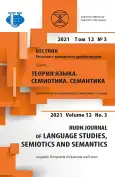English Career Terms Synonymy
- Authors: Filyasova Y.A.1
-
Affiliations:
- Saint-Petersburg State University of Economics
- Issue: Vol 12, No 3 (2021): Linguistic dominants of grammar and lexics
- Pages: 669-683
- Section: FUNCTIONAL SEMANTICS AND LINGUISTIC SEMIOTICS
- URL: https://journal-vniispk.ru/2313-2299/article/view/323358
- DOI: https://doi.org/10.22363/2313-2299-2021-12-3-669-683
- ID: 323358
Cite item
Full Text
Abstract
Synonymy is a linguistic phenomenon which reflects the complexity of reality representation in a linguistic worldview. Terminological synonymy poses certain difficulties for specialists who perform practical tasks in application areas such as translation and education. Career development, career advancement, career growth, career progression, career progress, career enhancement are among the most frequently used terms with similar semantics which indicates a certain degree of indefiniteness in the terminology in the correspondent professional field. The aim of this paper is to conduct comparative linguistic analysis of these terms. The material is presented by research article titles from eight scientific databases. Methods include quantitative and qualitative study of frequency, semantic fields by semantically related concepts, keywords, syntagmatic collocability and componential analysis. The results show that career development can be currently considered a hyperonym as it is the most frequent and time-proved term with the widest semantic coverage and indication to professional spheres in the dictionaries. Despite its obvious prevalence, career advancement , career progression, career growth and career progress are gaining momentum as alternative terms highlighting a lack of important semantic nuances in career development. Though the general number of career advancement and career progression across research papers is considerably lower, their presence in article titles is almost the same as that of career development. Title is arguably the most demonstrative part of a research paper; therefore, it can be presumed that the career terms might acquire lexical meanings which will clearly differentiate vertical career growth from horizontal organizational movement.
About the authors
Yulia A. Filyasova
Saint-Petersburg State University of Economics
Author for correspondence.
Email: phill.yield@gmail.com
SPIN-code: 9503-8000
PhD of Philological Sciences, Associate Professor of the Department of English Philology and Translation
Griboyedov Canal Embankment, 30-32 A, Saint-Petersburg, Russian Federation, 191023References
- Lemov, A.V. (2015). Whether doublets-synonyms are identical or not. Historical and social educational ideas, 7(3), 211-213. (In Russ.).
- Alomoush, O.I.S. (2016). Synonymy in Jordanian Arabic. Advances in Language and Literary Studies, 7(3), 243-247.
- Litvinova, L.A. (2016). Functions of synonyms in language. Innovative Science, 6(3), 128-131. (In Russ.).
- Nguyen, N.T.H., Miwa, M., Tsuruoka, Y. & Tojo, S. (2015). Identifying synonymy between relational phrases using word embeddings. Journal of Biomedical Informatics, 56, 94-102.
- Zubkova, L.G. & Karavaeva, E.M. (2008). Typology of verbal synonymous rows in the plan of expression. Scientific notes of KGU, 150(2), 219-227. (In Russ.).
- Maikova, T.A. (2016). Basic criteria for terminology selection in compiling lexicographic model of sociological terminology in English. RUDN Journal of Language Studies, Semiotics and Semantics, 2, 165-174. (In Russ.).
- Kalugina, Ju.E. (2020). Analysis of Country Specific Terminological Units in Economics from English Sources. RUDN Journal of Language Studies, Semiotics and Semantics, 11(3), 517-531. (In Russ.).
- Saprykina, O.A. (2016). Term as a phenomenon of language and of culture (history of words and concepts). RUDN Journal of Language Studies, Semiotics and Semantics, 2, 165-174. (In Russ.).
- Brochhagen, T., Franke, M. & van Rooij, R. (2018). Coevolution of lexical meaning and pragmatic use. Cognitive Science: A Multidisciplinary Journal, 42, 2757-2789.
- Okeke, G.T., Mbah, B.M. & Okeke, Ch.O. (2020). Re-Examination of Synonymy in the Standard Igbo. SAGE Open, 10(1), 21582440209.
- Bednárová-Gibová, K. (2019). Synonymic Traps in Selected English Lexical Semantics Terms. RUDN Journal of Language Studies, Semiotics and Semantics, 10(4), 754-760.
- Stevens, T.M., Aarts, N., & Dewulf, A. (2019). The emergence and evolution of master terms in the public debate about livestock farming: Semantic fields, communication strategies and policy practices. Discourse, Context and Media, 31, 100-317.
- Soluyanova, E. (2014). Synonymy of machine building terms. Izvestiya MGTU “MAMI”, 1, 237-240. (In Russ.).
- Apresyan, Yu.D. (1974). Lexical semantics: synonymous language means. Moscow. (In Russ.).
- Murphy, M.L. (2003). Semantic relations and the lexicon. Cambridge: University Press.
- Anagbogu, P.N., Mbah, B.M., & Eme, C.A. (2010). Introduction to linguistics. Amaka Dreams.
- Kobozeva, I.M. (2000). Linguistic semantics. Moscow: URSS. (In Russ.).
- Denisenko, V.N. & Leksina, I.A. (2016). Psycholinguistic characteristicsof the verbs of emotional 5 evaluative relations. RUDN Journal of Language Studies, Semiotics and Semantics, 3, 130-136. (In Russ.).
- Boholm, M. (2017). The semantic field of risk. Safety Science, 92, 205-216.
- Filyasova, Yu.A. (2019). The English Economic Term ‘Human Capital’ and Its Semantic Field in Scientific Discourse. RUDN Journal of Language Studies, Semiotics and Semantics, 10(3), 700-713.
- Filyasova, Yu.A. (2019). Effectiveness vs. efficiency: an analysis of valency and collocability in a technical context. RUDN Journal of Language Studies, Semiotics and Semantics, 10(1), 187-196.
- Yang, B. (2016). A Corpus-Based Comparative Study of “Learn” and “Acquire”. English Language Teaching, 9(1), 209-220.
- Ufimtseva, A.A. (1986). Lexical meaning. Moscow: Nauka. (In Russ.).
- Boran, G. (2018). Semantic Fields and EFL/ESL Teaching. International Online Journal of Education and Teaching, 5(2), 391-399.
- Vlavatskaya, M.V. (2009). Combinatorial semasiology (semantics and word combinability). MNKO, 7(2), 29-34. (In Russ.).
- Filyasova, Yu.A. (2020). A Linguistic Analysis of Petroleum-Related English Research Article Titles. RUDN Journal of Language Studies, Semiotics and Semantics, 11(1), 120-134.
- Liu, D. & Zhong, Sh. (2016). L2 vs. L1 Use of Synonymy: An Empirical Study of Synonym Use/Acquisition. Applied Linguistics, 37(2), 239-261.
- Cambridge Dictionary. URL: https://dictionary.cambridge.org/ru/ (accessed: 30.01.2021).
- Longman Dictionary of Contemporary English. URL: https://www.ldoceonline.com/ (accessed: 30.01.2021).
- Macmillan Dictionary. URL: https://www.macmillandictionary.com/ (accessed: 30.01.2021).
- Webster Dictionary. URL: https://www.merriam-webster.com/ (accessed: 30.01.2021).
- ERIC. URL: https://eric.ed.gov/ (accessed: 30.11.2020).
- IEEE Xplore. URL: https://ieeexplore.ieee.org/ (accessed: 30.11.2020).
- JSTORE. URL: https://www.jstor.org/ (accessed: 30.11.2020).
- SAGE. URL: https://journals.sagepub.com/ (accessed: 30.11.2020).
- Science Direct. URL: https://www.sciencedirect.com/ (accessed: 30.11.2020).
- The Directory of Open Access Journals. URL: https://doaj.org/ (accessed: 30.11.2020).
- Wiley. URL: https://onlinelibrary.wiley.com/ (accessed: 30.11.2020).
- Scopus. URL: https://scopus.com (accessed: 30.11.2020).
Supplementary files









